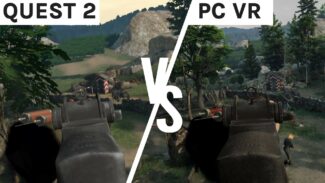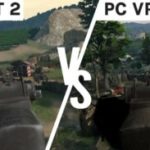We’re back with another side-by-side graphics comparison. This time it’s for Medal of Honor: Above and Beyond on Oculus Quest 2 and PC.
Surrounding its launch in late 2020, Oculus Studios said it would look into porting PC VR juggernaut, Medal of Honor: Above and Beyond to Oculus Quest, but couldn’t make any promises that it would actually end up happening. And it was clear to see why; though the game itself was somewhat flawed, Above And Beyond was a powerhouse in terms of performance, with issues even on the latest top-end graphics cards. In truth, we doubted it could ever really happen.
But, hey, here we are.
Medal Of Honor: Above And Beyond Graphics Comparison: Quest 2 Vs PC VR
Launched on November 15th, Above and Beyond is a full-on port of the original PC VR game, and the third full Oculus Quest 2 exclusive (as in, you can’t play it on Quest 1). That means you get the game’s full original campaign with multiple hours of gameplay, and the multiplayer modes, too. Above is our first look at the first 30 minutes of the campaign, which takes you through the tutorials, a handful of missions and a heck of a lot of cutscenes. This is a surprisingly story-heavy game with lots of moments of standing around talking to the game’s cast, which gives us a lot of opportunities to inspect character models and environments between the action.
Generally speaking, then, this is a very impressive conversion, with some levels even looking remarkably close to the PC original (considering the obvious constraints of the hardware). But the crucial point to get across with this port is that the difference in quality between the two versions really varies by the level. The opening prologue in Tunisia makes some heavy concessions, for example, removing smoke effects and background detail but all in an effort to retain some of the more impressive sequences like a plane flying past. Character models have also degraded but are still pretty impressive for Quest.
We’ve found the biggest differences in areas with vegetation and other big details. After three or four sequences that match up relatively well, it’s very surprising to suddenly launch into one woodland mission and see all of the bushes and shrubs that mask your presence in the PC VR version totally missing from this one. And that makes a significant impact to the gameplay, too, as enemies are easier to spot. But, moving further into the campaign, later levels like the Norway section still run very well.
Some of the more consistent issues involve the resolution making characters and objects blurry at a distance. Of course, these downgrades do mean the game actually runs pretty well on Quest at least. In my time with the game I’ve noticed some occasional moments of stutter and one crash — all of which happened when I was also screen recording — but, compared to the PC VR experience even with a 3070 Ti, that’s actually a much more favorable turnout.
All-in-all this is a really impressive port, then. The core game, however, still has its issues. Pacing remains a problem, even with skippable cutscenes, as level length is often short and keeps you from becoming fully immersed. But if you’re looking for a blockbuster experience with cinematic moments then Above and Beyond really is one of your best bets on Quest right now. We just hope that setting the bar for the performance like this means we’ll see games that run this well and play even better later down the line.
And that’s our Medal Of Honor: Above And Beyond graphics comparison. What did you make of the game? Let us know in the comments below!





